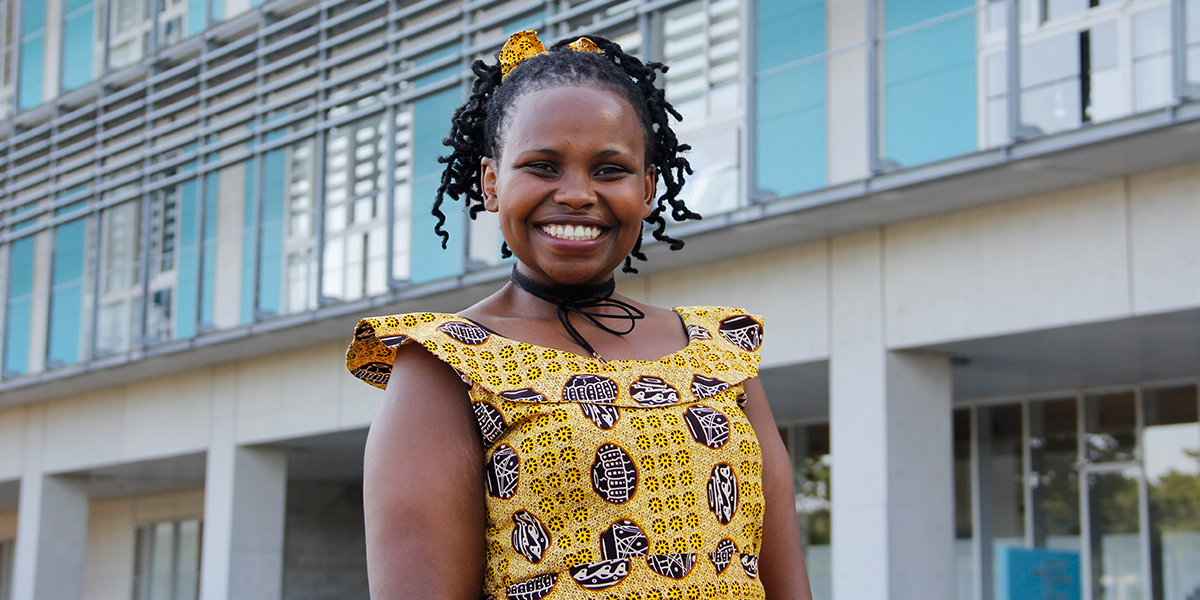
Dreams of Japan Lead to Dreams for Uganda
-
- Precious Akampumuza
- Doctoral degree student, Graduate Program in Sustainability Science – Global Leadership Initiative (GPSS–GLI), Graduate School of Frontier Sciences
Area of research: Climate change and health
Country/Region of Origin: Uganda
A Big, Red Motorbike Started it All
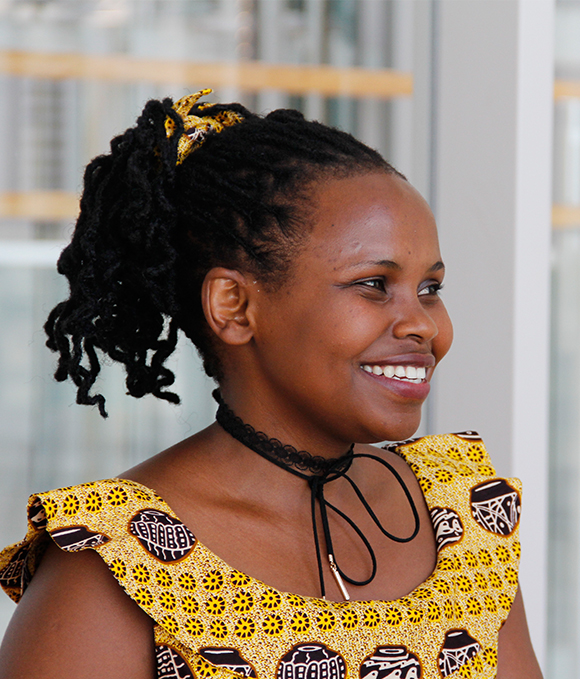
As a child growing up in a small farming village in rural Uganda, the thought of going abroad at all, much less to Japan, had never entered Precious’ mind. That is, until one fateful encounter with a certain machine…
“Made in Japan”
When I was a child, we had a sub-county chief in our neighborhood who owned a big, red motorbike with the word HONDA inscribed on it. I had never seen anything like it before. How someone somewhere could make such an impressive vehicle filled me with wonder. I asked what HONDA meant; I was told that it was the name of a Japanese company, and that the bike was made in Japan. From then on, I dreamed about going to the land where such an amazing machine was made. If you’re from a rural area like me, you don’t really think about going abroad, but you start to fantasize about it when you see things from abroad.
My dream remained just that for several years. Then, my husband received a scholarship to study economics at a Japanese university. That was my chance! I decided to come and join him in Japan. I’m now living what I once thought was impossible.
I didn’t hesitate
I wanted to further my education and career when I came to Japan, so I began looking into universities. One university immediately shot up to the top of my list: The University of Tokyo.
UTokyo has a huge reputation that speaks for itself. I first heard of the University of Tokyo soon after arriving in Japan. Whenever it got mentioned among my friends in Japan that someone goes to UTokyo, everyone would say “Atama ii ne” (“Wow, they must be smart”)! This is the university that everyone feels like they or their children should be a part of. So, I didn’t hesitate to apply. I have always felt that I have the potential to be among the top.
I applied to the Graduate Program in Sustainability Science – Global Leadership Initiative (GPSS–GLI), an English-language program in the Graduate School of Frontier Sciences, which I found out about from a friend and read about online. I discovered that sustainability science is a new, holistic area of study which is about making all kinds of systems more resilient. This discipline covers a wide range of fields, giving you the freedom to research on nearly whatever topic you want. During my undergraduate years, I had studied food science in the hope that I could contribute to Uganda’s fledgling food processing industry; however, learning about sustainability science led me to consider how I could contribute to my home country in a different way. Ensuring the sustainability of the environment was especially important for my country’s (and the world’s) future, I thought, so I chose the topic of climate change.
I mailed in a paper application, and then was asked to come to the University for an interview. In the interview room, a whole panel of professors sat facing me. I was nervous, but I realized then that this was my time. I was either in or out, so I had to give it my all and show them what I wanted to do as a UTokyo student.
There must be a way
Fortunately, I was accepted! I received an acceptance letter in the mail. I couldn’t believe it. I kept reading the letter over and over, thinking that maybe I had read it wrong. (laughs) Luckily, I was one of the chosen ones. The day I found out, I didn’t sleep the whole night!
My attention then turned to getting a scholarship. Many of my friends told me that it would be impossible to get a scholarship at a Japanese university since I was already in Japan. They had a point, as one of the most well-known scholarships, the Japanese government (MEXT) scholarship, can be applied for only from outside of the country. Their comments discouraged me, but in the back of my mind, I was thinking that there must be a way. I kept on believing, and my faith was rewarded with the GPSS-GLI Fellowship, which I was selected to receive after I was accepted! I received this scholarship for the duration of my Master’s degree studies, and again from the second year of my doctoral studies. I also applied for and received a privately-funded scholarship for a year. So, while it may be more challenging to get a scholarship when you’re already in Japan, my experiences prove that it is definitely possible!
Mesmerized
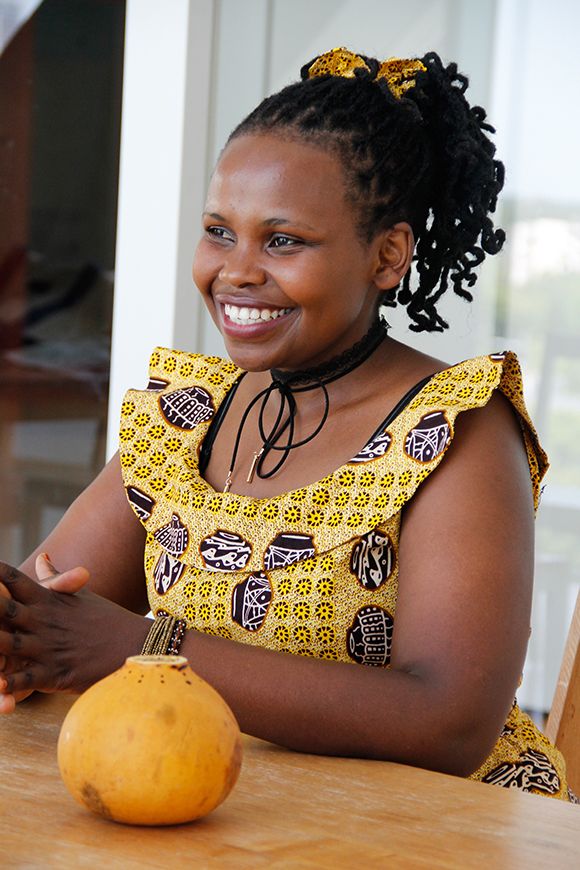
Back before I came to Japan, I had heard that Japan was developed, but I didn’t have a clear picture of what that meant. So, as I landed at Narita Airport and came into Tokyo, I remember feeling an increasing sense of awe. At the skyscrapers. At the electricity. At the fact that train stations have toilets—not just one, but several—and that they flush! My first impression of Japan went beyond my expectations, and I was humbled. I began to wonder why these things aren’t commonplace in Uganda even though we have the ability to make them. I want to continue exploring and learning more.
UTokyo is “self-contained”
I knew about the University of Tokyo’s many Nobel Laureates and about the research conducted here, so I was already aware that it was a top university. What surprised me, however, was how so much is provided for us. During orientation, we got to see the state-of-the-art library, and learned that everyone gets their own desk. We were also told about all of the different departments with people available to help us with anything, including emergencies, counseling, health issues, housing and daily life. In other words, we don’t have to look outside the University for help—it’s a convenient, self-contained environment. This aspect of university life is particularly important to international students, who have to live here as a family and need help acclimatizing to Japan.
Encouraging or demoralizing?
I don’t know by what magic, but before coming, I had expected that Japanese people would know English! I didn’t think it would be possible to go to a supermarket or restaurant and have no one understand what I wanted to buy or order. Many people back in Uganda can’t believe that English isn’t widely spoken in Japan. As English is Uganda’s official language, we tend to think of English as universal. That is not the case in Japan, though, so life can be difficult.
For that reason, I have been trying to learn Japanese. I know hiragana, katakana and a few kanji. Kanji in particular are challenging. Some Japanese people can’t even read certain kanji! I’ll ask someone for help in reading a kanji, and they have to look it up themselves! This kind of thing either encourages you or demoralizes you, depending on how you look at it. When you see that even Japanese people can’t read a certain kanji that you don’t know, you may not feel so alone. However, at the same time, you might feel discouraged when you consider how much effort you need to put forth to learn Japanese when someone who was born and has lived in Japan for 30-40 years can’t read all the kanji!
At first, I was determined to make sure that I could write an essay using kanji by the time I left Japan. That goal is proving to be challenging to achieve, though. To conduct fieldwork, I sometimes travel back to Uganda for around two months at a time, and promptly forget all the Japanese I had learned. I asked myself, “Should I not go back home?” (laughs) While I previously took the optional Japanese classes offered at the Graduate School of Frontier Sciences, I’m now learning Japanese on my own. I learn a kanji every day, and try to read books in Japanese with hiragana phonetic readings written above the kanji. I watch movies in Japanese, too.
My favorite kanji is one of the easiest: 田 (rice paddy). I like it because it’s one of the first kanji I learned. I have to guess how to read it, though, because sometimes it can be read as “ta” and at other times, “da.”
By the way, the first Japanese word I read by myself was あぶない (abunai; dangerous). After a full day of studying hiragana, I went outside to go shopping. I saw a sign in the middle of the road that said あぶない, and I was able to read it! I was extremely happy. At that moment, I felt that my effort to learn hiragana had paid off.
Home away from home
I live in an area just outside of Tokyo that is very convenient. A shopping mall, hospital, supermarket, bank and convenience store are all within walking distance! In my free time, I love going to the gym for Zumba lessons and yoga. I didn’t know I was flexible until I started doing yoga! (laughs) Also, my husband graduated in 2015 and is now living in Rwanda, a country neighboring Uganda, with our three young children. I miss them, but I visit them whenever I go back to Uganda, and I also do video chats online with them here in Japan. I always tell my kids to stand up so I can see how much they’ve grown. They grow up so fast!
Climate Change is Coming for Us
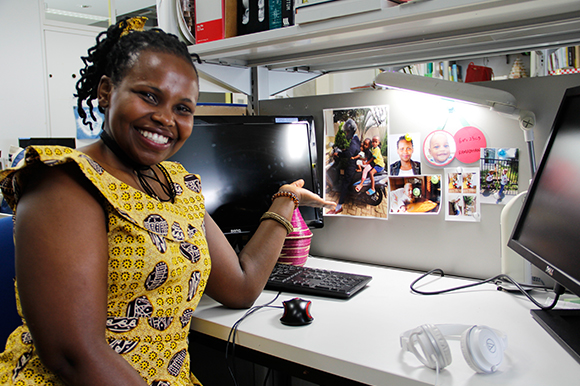 Precious proudly keeps pictures of her kids at her desk in the lab
Precious proudly keeps pictures of her kids at her desk in the lab
Precious entered GPSS–GLI in April 2014, earning her Master’s degree in 2016. Her thesis concerned the effect of climate change on food security. She is currently pursuing her doctorate, researching how climate change impacts human health.
The small size was a big surprise
My lab is supervised by Professor Hirotaka Matsuda, and we meet once a week. We take turns presenting our research work, while the professor and other lab members give feedback. The small size of the lab was a big surprise to me! There are only six people in my lab, whereas back in Uganda, it’s normal for classes to have more than 100 students. Also, despite the small size, the lab members come from diverse backgrounds; we have people from China, Japan, Kenya and Uganda (me).
Food security, health and climate change
For both my Master’s and my PhD, I have conducted research related to climate change. Climate change is a global phenomenon that affects all aspects of life, and my research highlights this fact. During my Master’s degree studies, I focused on the relationship of climate change with the food security of urban households in Uganda. Climate change in general affects all households, but through my research I found that the impact on female-headed households is more severe. When people think about global and regional issues that affect women, climate change is probably not one of the first things to come to mind. However, the women I interviewed had received less education and had less access to resources than men—two factors that led to a decrease in their resilience to climate change.
My current research has to do with how climate change affects human health. Just as with my research findings on climate change and women, many may not immediately see that climate change also influences health. Empirical evidence is necessary to better understand the effects of climate change, so I am collecting and analyzing data. My focus is on infectious diseases, specifically diarrhea. So far, I have found a chain of factors showing that climate change leads to an increase in diarrhea rates. Climate change causes prolonged droughts, leading to water scarcity. Water scarcity, in turn, leads to poor hygiene, which causes an increase in infectious diseases, including diarrhea.
To collect research data, I conduct fieldwork in Uganda during spring and summer breaks. For my Master’s, much of my data was based on surveys and interviews I carried out at local households. The data for my doctoral research, on the other hand, has been much more difficult to obtain. For instance, the district health offices often do not have soft copies of statistical data on diseases, so I have to go back into the archives and take pictures of the hard copies with my phone to analyze later. It is a frustrating process, but I am confident that I now know more about the data than the health department officials themselves do!
The impact of climate change on health is an under-researched area, especially in Africa. Climate change has already taken its toll on the lives of many in Africa and elsewhere around the world. When you’re here in Tokyo, you may not feel them directly, but the effects of climate change are there. It’s not about one person; what affects you also affects others. Climate change is coming for all of us. That’s why we need a combined global effort to tackle it.
We have no excuse not to do our research
The University of Tokyo provides us with all kinds of people, opportunities and resources to help us carry our research. For instance, our supervising professors, whom I like to call our “research fathers,” oversee our research from beginning to end. Also, the University provides funding for fieldwork travel, 24/7 internet access, and subscriptions to various academic journals so we can reference previous research. We also get to meet people who have achieved substantial success in their research, such as UTokyo Professor and Nobel Laureate Takaaki Kajita. When people like him come and talk to us, we become inspired to work harder ourselves. We also have the opportunity to meet professors who are knowledgeable about different areas pertaining to our research, and we can present our research at international conferences. Everything we could possibly need is available to us, so we have no excuse not to do our research! (laughs)
Bridging the Gap between Policymakers and Researchers
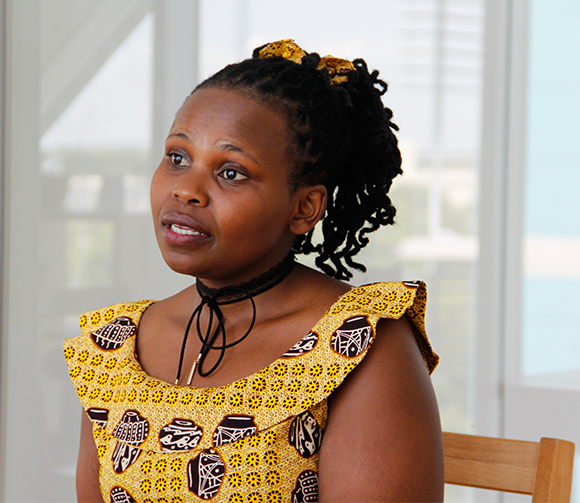
Through her time at UTokyo, Precious has come to realize more than ever before the importance of research and data analysis. She plans to complete her PhD in 2019, after which she wants to put her experiences to use by influencing the formulation of health policy.
You don’t miss what you don’t know
I feel that I have matured mentally since coming to Japan. For instance, time management is a part of me now. As a wife, mother and student, I also have had to learn how to multitask. Most importantly, though, living in Japan has shown me that we have a lot of resources in Uganda that we can use to better our lives. Unfortunately, however, we’re not currently putting these resources to use. The desire to change that is one of the things that pulls me back to my country. Also, I have a newfound appreciation for research. I understand now that everything, including health and protecting the environment, revolves around research. Until you leave Uganda, you’re in a status-quo bubble. You don’t think about anything outside of that bubble; you don’t consider any new possibilities. And you’re content, because you don’t miss what you don’t know. But since coming to UTokyo and conducting my research, I have discovered many interesting things that have caused countless “why” and “how” questions to spring up in my mind. I’m more inquisitive and optimistic now. It’s amazing how I’ve changed!
The power of data
After I complete my degree, I want to research global trends and innovations in the health sector in order to tackle health issues. I would love to see my research taken into account during policy formulations. In developing countries, there is a big gap between policymakers and researchers. Policymakers often don’t make policies based on research or empirical evidence, which I think impacts people negatively. In Uganda, for instance, one of the reasons health officials sometimes run out of medicine for an area is because they don’t have data showing the current numbers of people living in that area. They just formulate policies and make estimates based on assumptions (as some of the health officials alluded to me). This frustrates me deeply. At the very least, the health departments should have researchers to provide empirical evidence and do analysis, so policies can be formulated that have a positive impact on the population. They have to know what happened previously to plan for the future.
Diarrhea, an entirely preventable and treatable illness, is still one of the leading causes of death among children in Uganda. People in Japan live decades longer than Ugandans do. Uganda has abundant natural resources compared to Japan, and yet Japan has a much stronger economy. Why? I want to put my experiences in Japan to practical use, so I can answer this question and help improve the lives of all Ugandans.
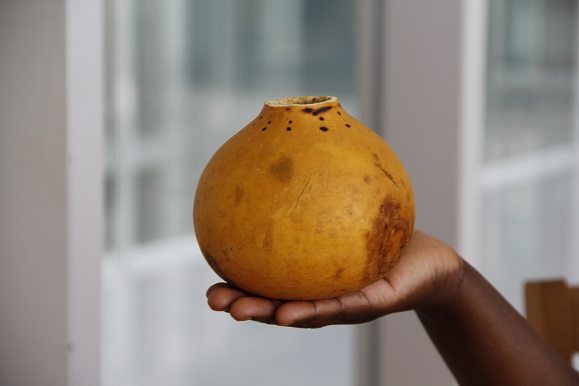
Calabash Container for Cow Ghee
A precious piece of home
Precious treasures this hollow calabash gourd that she uses as a container for cow ghee, a milk byproduct found in Ugandan cooking. Cow ghee is often seen in Ugandan dishes as a sauce or spice, and it is also used in place of cooking oil. Precious’ aunt decorated the calabash and gave it to her as a gift, and Precious brought the ghee in it with her all the way to Japan. She sometimes uses the ghee in her cooking to give her dishes a taste of home. In Uganda, it is common for cow-keeping communities to have these kinds of containers for storing dairy products, including ghee. Much larger gourds are often used, but Precious says that those were too big to carry to Japan!
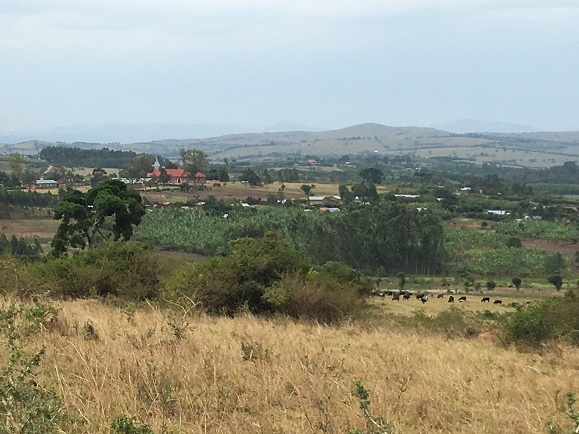
Nyarwanya Village
Precious’ hometown in the “Pearl of Africa”
The country of Uganda is nicknamed the “Pearl of Africa” because of its vibrant natural resources and quintessential African beauty. Sitting right on the Equator, Uganda experiences pleasant temperatures throughout the year. African buffaloes, elephants, lions, leopards, rhinoceroses, and gorillas all inhabit Uganda, making the country a veritable menagerie of African wildlife. Uganda also enjoys a diversity of cultures, with dozens of tribes calling the country home. Precious comes from a small agricultural village called Nyarwanya in Rukungiri District. The residents of this serene farming community grow vegetables and raise cattle and goats. She loves her hometown, calling it a “village of milk and honey.”






